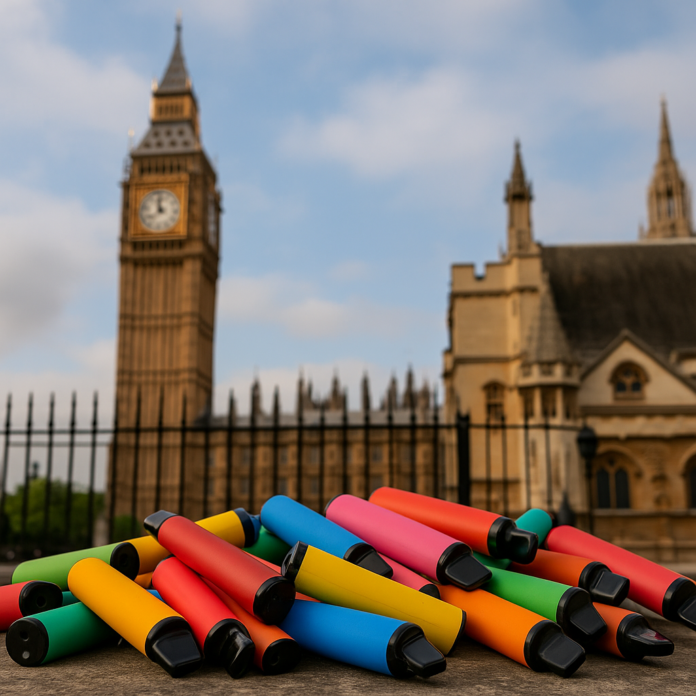
As of June 1, 2025, the sale and supply of single-use disposable vapes are prohibited across the United Kingdom. The new measure targets a growing concern among public health officials and environmental groups regarding youth vaping and the widespread disposal of non-recyclable electronic waste.
The ban covers all retail settings, including convenience stores, supermarkets, online vendors, and market stalls. It applies to any vaping product that is not rechargeable or refillable. Businesses that continue to stock or sell these items face initial civil penalties, including a £200 fine in England, with repeat offenses leading to potential court action or imprisonment. Similar enforcement rules have been adopted in Scotland, Wales, and Northern Ireland.
This move follows years of increased scrutiny around the popularity of disposable vapes, such as Elf Bars and Lost Mary, which are frequently marketed with colorful packaging and sweet flavors. Public health surveys show these products have gained traction among younger users. Data from NHS Digital indicates that one in four children aged 11 to 15 has tried vaping, and nearly one in 10 uses e-cigarettes regularly.
Although vaping is often used as a smoking cessation tool, its rising popularity among individuals who have never smoked has led to calls for more oversight. An estimated 5.6 million people in the UK vape, and around one-quarter of them were using disposable products before the ban.
Health officials continue to emphasize that vaping poses fewer health risks than traditional tobacco use. However, the long-term effects remain uncertain, especially among younger demographics. Some doctors have raised concerns about possible links to lung irritation, nicotine addiction, and heart issues.
The government has also cited environmental risks as a driving force behind the decision. Disposable vapes contain lithium batteries and electronic components that are rarely recycled properly. According to the Department for Environment, Food and Rural Affairs, nearly five million single-use vapes were discarded each week last year in the UK, with many ending up in landfills or improperly disposed of in household waste. These discarded items have been linked to hundreds of fires in refuse trucks and waste processing facilities.
Scott Butler, executive director of Material Focus, noted that the widespread littering and fire hazards associated with these devices demand a change in consumer behavior and manufacturer accountability. “The scale of improper disposal has created ongoing risks. Producers and retailers must now comply with their legal obligations to offer recycling options,” he said.
Environment Minister Mary Creagh described the measure as an overdue step to reduce electronic litter and limit nicotine exposure among youth. She emphasized that the ban does not criminalize possession of these products, focusing instead on sales and distribution.
Retailers have expressed concerns about enforcement and potential customer dissatisfaction. Some shopkeepers noted a rush of purchases ahead of the ban, with older consumers stockpiling products. Surveys showed that nearly 40% of disposable vape users have accumulated enough to last several months, with the 45–54 age group leading in stockpiling activity.
Industry groups remain divided. The UK Vaping Industry Association has warned that the ban could create unintended consequences, such as encouraging black market sales or prompting some vapers to return to traditional cigarettes. Director General John Dunne stated, “We’ve always maintained that enforcement of existing rules would be more effective than a total sales ban.”
Public health advocates, however, believe the ban is only a first step. Hazel Cheeseman of Action on Smoking and Health argued that further regulation—particularly around branding and marketing—is needed. “The appeal to young users is driven by packaging, pricing, and accessibility. Addressing only one of these issues will have limited impact,” she said.
Additional changes are on the horizon. A new vaping duty is scheduled to begin in October 2026, adding a £2.20 tax per 10ml of vaping liquid. The Tobacco and Vapes Bill, still under parliamentary review, proposes further restrictions on advertising, packaging, and flavors.
In the meantime, businesses are required to remove leftover stock of disposable vapes from shelves and arrange for proper recycling. The Office for Product Safety and Standards has warned that improper disposal or storage could lead to enforcement actions.
The UK joins a growing list of countries, including France and Belgium, that are moving to restrict or eliminate single-use vaping devices. The ban reflects ongoing efforts to balance the needs of adult smokers with the responsibility to reduce youth exposure and limit environmental harm.
This image is the property of The New Dispatch LLC and is not licenseable for external use without explicit written permission.







